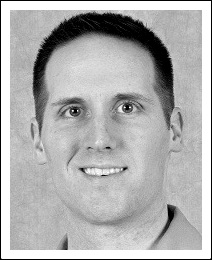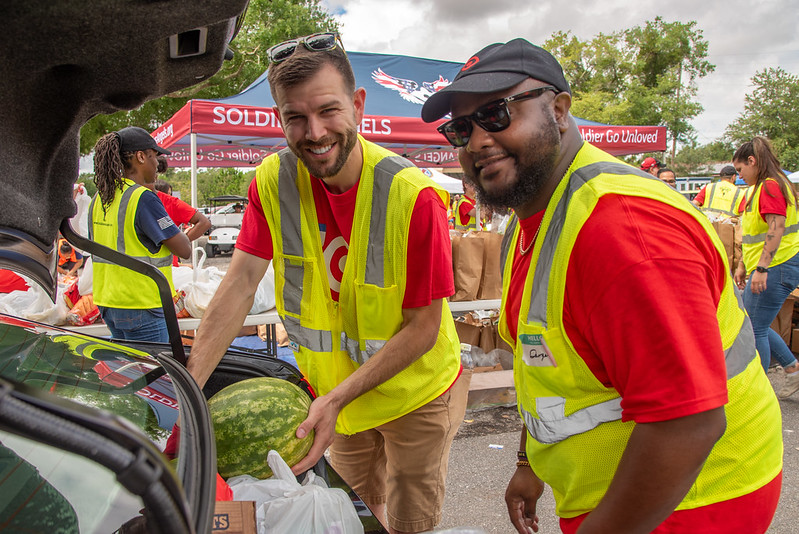
From left, Master-at-Arms 1st Class Cisco Rivera, Mullen Buries and Stefon Pawlowski salute the flag and say the Pledge of Allegiance during their graduation from the Veterans Treatment Assistance Court program at 19th Judicial Circuit, Lake County, Ill. The program, which partners Lake County government with Lovell Federal Health Care Center, Veterans service organizations and other community organizations is meant, ensure that ensures no Veteran is left behind – not on the battlefield or back at home. It provides “justice-involved” active duty military and Veterans an option to address their needs through treatment intervention, instead of incarceration.
The 19th Judicial Circuit of Lake County, Ill., Veterans Treatment Assistance Court (VTAC) program graduated three enrollees at a ceremony in February, assisted by the Captain James A. Lovell Federal Health Care Center.
Navy Master-at-Arms 1st Class Cisco Rivera, Army Veteran Mullen Buries and Navy Veteran Stefon Pawlowski graduated in front of family, friends and many local dignitaries at Lake County Courthouse, after successfully meeting a strict schedule of conditions that include completing treatment and meeting regularly with mentors and probation officers.
Lake County Court officials partnered with Lovell Federal Health Care Center, Veterans service organizations and other community organizations to start the court program in 2011, with the intent of never leaving a Veteran behind, much like the code on the battlefield. The program provides an opportunity for “justice-involved” active-duty military members and Veterans to address their needs through treatment intervention, instead of incarceration.
“Our program is a collaborative effort that gives those who have served their country honorably the second chance and the help that they very much deserve,” said 19th Judicial Circuit Chief Judge John Phillips, who has presided over VTAC since its inception. “It is energizing for all of us on the Veterans court team to be a part of this project.”

Army Veteran Mullen Buries addresses the audience during his graduation from the Veterans Treatment Assistance Court program at 19th Judicial Circuit, Lake County, Ill. The program, which partners Lake County government with Lovell Federal Health Care Center, Veterans service organizations and other community organizations, ensures no Veteran is left behind – not on the battlefield or back at home. It provides justice-involved active-duty military and Veterans an option to address their needs through treatment intervention, instead of incarceration.
Licensed clinical social worker Jessica Pinder, Lovell Veterans justice outreach specialist, said the relationship between Lake County Court and Lovell– the nation’s first federal health care center integrating VA and Department of Defense health care – is a unique opportunity for enrollees.
“They [get to] participate in treatment for mental health, addictions, and/or physical health, in an environment that is supportive, while following court requirements,” Pinder said. “With VA and the county courts working together, it provides a lot more support than if they were working independently of one another.”
Pinder works with all program enrollees who are eligible for VA benefits.
“Once the Vet is referred to the Veterans court, I meet with him or her and do a full assessment. We come up with a treatment plan by determining what the Veteran’s mental or physical health needs may be; and the court supports that treatment plan,” Pinder said.
To graduate, enrollees must complete all required steps such as community service, pay court fees, and attend required meetings and treatment appointments. Pinder said that upon graduating, the court process ends, but treatment continues as needed.
The Lake County VTAC program had 43 enrollees at the time of the graduation, and has graduated 11 people to date. The probation period typically lasts 12 to 30 months.
Roxann Garza, 19th Judicial Circuit Division of Adult Probation Services probation officer and VTAC coordinator for Lake County, said the program accomplishes more than just helping Veterans get their lives back on track. It also helps them address underlying concerns discovered during the acceptance stage, when VA and probation officials assess the cases.
When Veterans or Servicemembers start the court process, Garza and her office are notified and can then inform them of the VTAC option.
“It’s extremely rewarding to see them graduate, and I feel honored to be the one to introduce them as graduates,” said Garza, an Army Veteran herself. “I see them when they first join the program, and I am the one who is able to see the progress they make on a daily, weekly and monthly basis. Some of our Vets, when they begin the program, are addicted to drugs or alcohol and are somewhat resistant to change. So we provide them with the tools they need to succeed … every step of the way.”
Garza said the program is successful because Veterans are in constant contact with probation and VA officials, treatment providers and the judges; each Veteran is assigned a VTAC mentor.
“Our mentors are Veterans who volunteer their time to provide additional assistance and guidance for our Vets,” Garza said. “The mentors are screened and assigned to the Vets in the program according to branch of service, era of service and age. Our VTAC mentors are involved in all aspects of the Veteran’s treatment.”
The graduates expressed gratitude for the dedication of VTAC program staff to help enrollees take positive steps forward.
“They lift you up and let you know that you’re better than what you did,” Buries said. “It gave me a different insight as to who I was and that I was looked up to by being a Veteran.”
“It gave me a second chance to continue my career,” Rivera said.
Buries looks forward to using his knowledge from the program to mentor others. “I’ve been empowered by going through [VTAC],” he said, “and I feel like I can help somebody else get a leg up on life.”
For more information about VTAC, contact Suzanne Willett at 847-377-3077 or Roxann Garza at 847-377-3644. For more about mentorship, contact Rudy Martin at 847-377-3964.

Topics in this story
More Stories
Soldiers' Angels volunteers provide compassion and dedication to service members, Veterans, caregivers and survivors.
Veterans are nearly three times more likely to own a franchise compared to non-Veterans.
The Social Security Administration is hoping to make applying for Supplemental Security Income (SSI) a whole lot easier, announcing it will start offering online, streamlined applications for some applicants.







NAS Pensacola has something like this. Great job on all of you. Thanks for a job being well done.